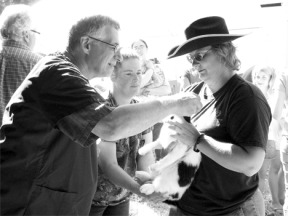Katie, Emma and Maria Leese have been working hard all year to get their Romney sheep ready for prime time at the Island County Fair.
But first, they have to get by Dr. Robert Moody.
Moody is one of four Whidbey Island volunteer veterinarians who makes sure the Leeses’ animals — and all the other critters great and small — are healthy enough for the fair.
As the girls struggled to keep their sheep still and head held high, Moody checked the animals’ mouth and between the digits on its hooves for any telltail signs of contagious disease.
“I tell them, if there are any sores, or in the case of cows, warts, they have to go home,” Moody said as Katie approached with another of her
10 sheep.
“Healthy animals are safe animals. And when they’re in good health that shows our 4-H’ers are being successful with their projects and the requirements of grooming, nutrition and exercise,” he said.
Katie and her sisters belong to the Whidbey Shepherds Club and she’s been raising sheep on the family’s fourth-generation spread — Bestemors Farm in Greenbank — half her life. That’s about eight years.
“Our sheep originated in the Romney marshes near Kent in England,” she explained. “It has a climate similar to Whidbey Island and they adapt well.”
Alex Martines raises big animals on his family’s farm south of Coupeville; his specialty is sheep. “I’ve been doing this about five years,” he said after his animals were vetted by Moody.
His favorite part of the fair isn’t the curly fries or the rides — it’s the auction.
“I sell my market lambs and get money for them,” he said. “They aren’t pets.”
Space gets cramped as Moody works quickly outside the various barns, dodging the carnies with their big rigs as they jockey for space to set up their rides.
Moody is a self-described late bloomer. After a career in the Navy, he went back to school to get his degree.
“I like people and animals both,” he said. “Some don’t enjoy the former.”
Much of Moody’s regular work involves preventive care to maintain the health of the animals.
“I test for and vaccinate against diseases and consult with farm or ranch owners and managers regarding animal production, feeding, and housing issues,” Moody said. He also treats and dresses wounds, sets fractures and performs surgery, including cesarean sections on birthing animals. And, sadly, sometimes he has to euthanize animals when necessary.
His work at the fair, though, is something special.
“I like giving back to the community; it’s all about these terrific kids and the tremendous work they do all year. This is their time,” he said.
Nearby, hopeful chicken and rabbit owners were lined up outside the rabbit barn as Dr. David Parent from Freeland checked them over for lice and any sign of transmissible disease.
“Lice and other parasites are common among chickens,” Parent said.
Parent has been helping out for 17 years because he enjoys the interaction between the children and their animals. “It’s fun and worth every moment.”
Not everything goes smoothly, however. Several years ago a little white bunny leaped off the table.
“He was headed for my neck,” Parent recalled.
The poultry get special attention from state Department of Agriculture scientist Jeff Howlett, who carefully takes a swab from the inside of each bird’s beak and keeps careful track of the particulars.
It’s serious work.
“I’m swabbing for any signs of avian influenza,” he said. “If we don’t look for it, a problem could develop so we do surveillance whenever we can.”
The results are checked for any DNA similarities to the bird flu virus.
“We want our 4-H kids to be safe around their project animals, even when both are under stress,” he said.
In other venues, Dr. Rebecca Moody handled cats and dogs while Dr. Lark Gustafson examined guinea pigs.
None of the doctors had to turn anyone away this year.
“Everyone was well prepared,” Parent said.
Jeff VanDerford can be reached at 221-5300 or jvanderford@southwhidbeyrecord.com.



